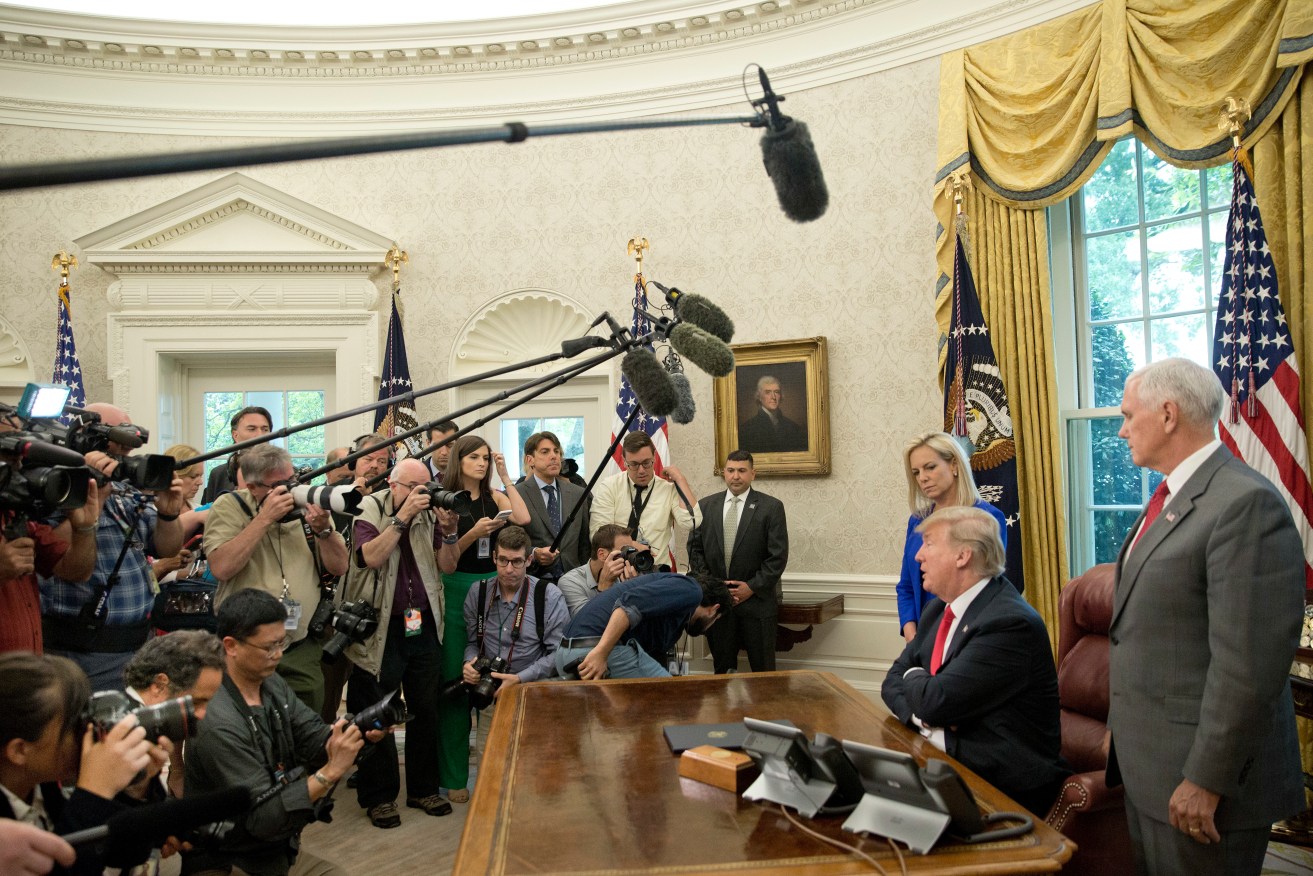Trump backs down on separation of children policy
UPDATED | US President Donald Trump has backed down and abandoned his policy of separating immigrant children from their parents on the US-Mexico border, after images of youngsters in cages sparked outrage at home and abroad.

President Donald Trump after signing an executive order to end family separations. Standing with him are Homeland Security Secretary Kirstjen Nielsen and Vice President Mike Pence. Photo: AP/Pablo Martinez Monsivais
Trump signed an executive order requiring that immigrant families be detained together when they are caught entering the country illegally for as long as their criminal proceedings take.
While the change may end a policy that drew a rebuke from Pope Francis and everyone else from human rights advocates to business leaders, it may also mean immigrant children remain in custody indefinitely.
The Trump administration still faces legal challenges because of a court order that caps how long immigration authorities may detain minors, and trigger fresh criticism of Trump’s hardline immigration policies, which were central to his 2016 election campaign and now his presidency.
A Justice Department official was unable to clarify whether family separations would end immediately or when and how families now separated would be reunited.
The Trump order, an unusual reversal by him, moves parents with children to the front of the line for immigration proceedings but it does not end a 10-week-old “zero tolerance” policy that calls for prosecution of immigrants crossing the border illegally under the country’s criminal entry statute.
“It’s about keeping families together while at the same time making sure that we have a very powerful, very strong border,” Trump said as he signed the order in a hastily arranged Oval Office gathering.
Video footage of children sitting in cages and an audiotape of wailing children had sparked anger as the images were broadcast worldwide.
Governments from Central America and Mexico welcomed Trump’s decision on Wednesday, but said they would remain vigilant to ensure the rights of their citizens were respected.
An avid viewer of cable television news, Trump recognised that the family separation issue was a growing political problem, White House sources said.
Trump’s wife, Melania Trump, in private conversations with the president, urged him to do something to end the humanitarian crisis, a White House official said.
In the Oval Office, Trump said he had also heard from his daughter and aide, Ivanka Trump, about the policy.
“Ivanka feels very strongly. My wife feels very strongly about it. I feel very strongly about it. I think anybody with a heart would feel very strongly about it,” Trump said.
Wednesday’s move was the most significant policy reversal by Trump since he took office in January 2017. Instinctively combative and fond of chaos, Trump usually digs in on controversial policies, rather than backing down.
He had tried to blame Democrats for the policy of separating children from parents and force them into concessions, including funding for a wall he wants to build along the border with Mexico. Just in the past few days, he had insisted his hands were tied by law on the issue of family separations even though his administration implemented a “zero tolerance” policy.
But the volume of condemnation on breaking up families, from inside and outside the White House, finally overwhelmed Trump.
Gene Hamilton, counsellor to US Attorney General Jeff Sessions, told reporters the Justice Department will seek changes to a 1997 settlement known as the Flores agreement, which set nationwide policy for the detention of minors in the custody of immigration officials.
A federal appeals court has interpreted the Flores agreement to allow immigration officials to detain families for only 20 days.
– Reuters




